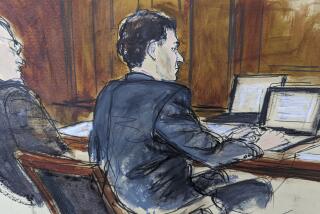Milken Files a Countersuit Against Drexel : Securities: He says his former employer deprived him of hundreds of millions of dollars in compensation.
NEW YORK — Michael Milken, answering a lawsuit filed by Drexel Burnham Lambert Inc. and launching some charges of his own, asserted on Wednesday that he had acted in the firm’s best interests “at all times” and contended that Drexel had improperly deprived him of hundreds of millions of dollars in pay and other benefits.
“All of Michael Milken’s acts as a Drexel employee, including the offenses to which he pleaded guilty, were within the scope of his employment, authorized by Drexel, or otherwise consistent with Drexel’s policies and practices,” said the imprisoned former junk bond king’s answer and countersuit, filed in U.S. District Court.
Milken pleaded guilty to six felony violations of securities laws last year. He is serving a 10-year sentence at a federal prison in Pleasanton, Calif., for offenses he committed while heading Drexel’s Beverly Hills-based high-yield bond department.
Drexel sued Milken and his brother, Lowell, in September, charging them with racketeering, breach of fiduciary duty and misappropriation of corporate assets. The civil suit charged the Milkens with using “a bewildering maze” of partnerships, trusts and corporations to defraud Drexel.
Drexel’s suit grew out of a settlement plan under which the firm hopes to emerge from bankruptcy proceedings. Under terms of the settlement plan, Drexel is obligated to go after the assets of former employees and, if successful, to turn them over to the once-high-flying brokerage firm’s creditors.
Milken’s countersuit seeks unspecified damages totaling hundreds of millions of dollars for pay he failed to receive in 1988 and the first half of 1989. Charging breach of contract, Milken also asked the court to order Drexel to pay him $67 million for Drexel stock and an unspecified amount for legal fees for past, current and future cases relating to his work at Drexel.
“Drexel never informed Mr. Milken or even suggested to him that if he was convicted he would be working for nothing, and would be required to forfeit all of his compensation back to the firm,” the countersuit said.
The counterclaim also alleged that, just before filing for bankruptcy, Drexel asked Milken to cover losses it sustained making large loans to clients “against Mr. Milken’s advice.” The amount of money allegedly requested was not mentioned. This would have violated Drexel’s civil settlement with the Securities and Exchange Commission, which barred the firm from associating with Milken.
Richard J. Davis, an attorney representing Drexel in the bankruptcy proceedings, said: “I’ve never heard that this happened.” A spokesman for Drexel, who asked not to be named, said the firm’s financial executives “are unaware of any such request.”
Milken also maintained that Drexel and its top officials were fully aware of the activities of Milken-created partnerships and that Drexel--rather than being victimized--in many cases benefited from the activities.
“Far from diverting opportunities, Michael Milken--at Drexel’s request and at his own risk--created a lucrative opportunity for Drexel to earn huge investment banking fees” by having his partnerships buy risky securities that allowed deals to go through, Milken charged.
More to Read
Inside the business of entertainment
The Wide Shot brings you news, analysis and insights on everything from streaming wars to production — and what it all means for the future.
You may occasionally receive promotional content from the Los Angeles Times.










